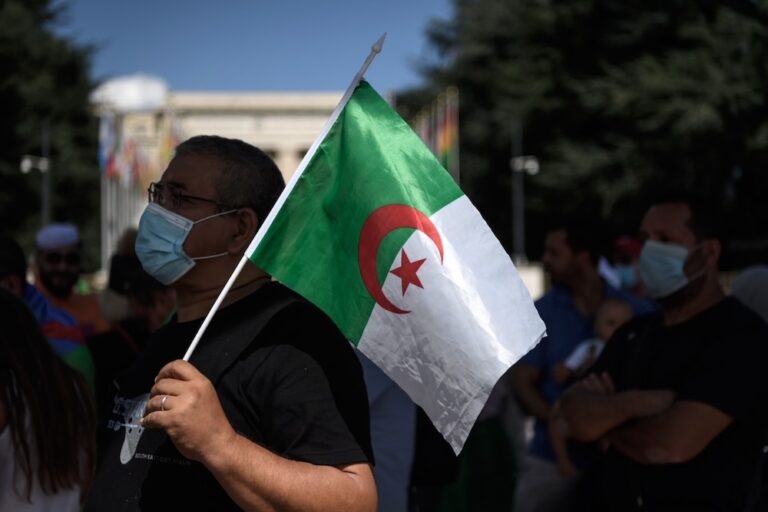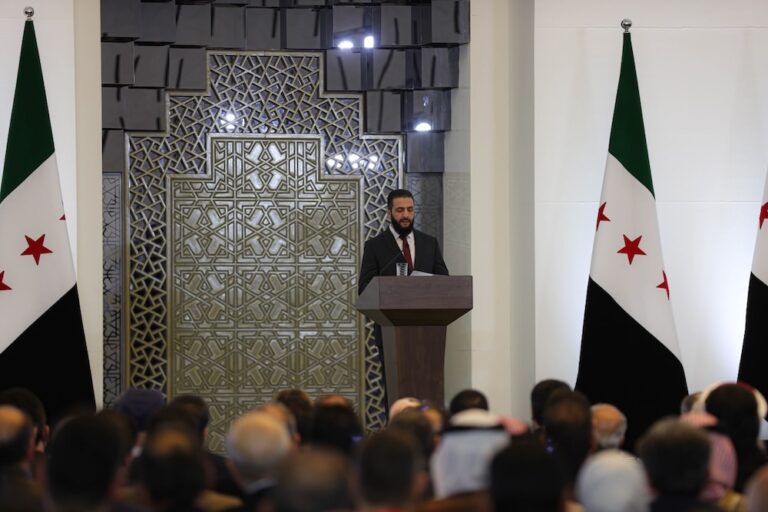(Freedom House/IFEX) – The following is a 21 December 1999 Freedom House press release: FOR IMMEDIATE RELEASE Democracy Momentum Sustained As “Freedom’s Century” Ends Freedom House Report Ranks 120 Countries as Democratic, Largest Number Ever WASHINGTON, December 21 – The momentum towards freedom around the world was sustained during 1999, according to a global survey […]
(Freedom House/IFEX) – The following is a 21 December 1999 Freedom House press release:
FOR IMMEDIATE RELEASE
Democracy Momentum Sustained As “Freedom’s Century” Ends
Freedom House Report Ranks 120 Countries as Democratic, Largest Number Ever
WASHINGTON, December 21 – The momentum towards freedom around the world was sustained during 1999, according to a global survey released today by Freedom House. The organization’s annual Freedom in the World survey indicated that freedom gained ground in 26 countries, while setbacks for freedom were recorded in 18 countries.
Despite the persistence of civil strife in a number of countries and growing problems with corruption in societies emerging from authoritarian rule, the Survey found that 85 countries, representing 44 percent of the world total, were Free and their inhabitants enjoy a broad range of political rights and civil liberties. Fifty-nine countries, (31 percent) rank as Partly Free, a category which indicates human rights problems, some restrictions on liberty and a weak rule of law. The Survey also finds that 48 countries (25 percent of the world total) are Not Free, indicating systematic human rights violations and the absence of democratic institutions.
“Our findings for 1999 show the further momentum of the march towards freedom and democracy that has been a notable feature of the twentieth century,” declared Adrian Karatnycky, president of Freedom House. “At the beginning of the century, not one country granted its citizens universal suffrage. Today, three-fifths of the globe’s population lives under democratically elected governments.”
The end of century Survey of Freedom found that 2.34 billion people (39 percent of the world’s population) now live in Free societies, 1.5 billion (25 percent) live in countries that are Partly Free, and 2.1 billion (36 percent) live in countries that are Not Free. “China accounts for over one half of those living under Not Free conditions,” observed Mr. Karatnycky.
“Despite the horrors of global war and genocide, in the end, this has been democracy’s century,” declared Bette Bao Lord, chairman of Freedom House. “If the world’s community of established democracies embraces freedom as a major goal, the next century will be freedom’s century as well.”
Among the Survey’s principal findings:
*Nearly two-thirds of the world’s countries, or 120 countries, have achieved democratic rule, the highest number of democracies ever and a gain of three over last year.
*The majority of the world’s Muslims now live under democratically elected governments. This includes the recent additions of Nigeria, where approximately half the population is Muslem, and Indonesia, the world’s most populous Islamic country. The survey also indicated stirrings of democratic ferment in several of the Persian Gulf monarchies and growing public clamor for freedom in Iran.
*Ten years after the collapse of East European Communism, the picture of the post-Communist world remained mixed. In Central Europe and parts of the Balkans, modest gains for freedom were recorded. Unfortunately, with the exception of the Baltic states, the countries of the former Soviet Union gave evidence of political stagnation and in the important case of Russia, which is prosecuting a brutal war against the Chechen people, experienced actual decline.
The “Worst of the Worst”
Thirteen countries receive Freedom House’s lowest rating for political rights and civil liberties. Three remain under the domination of Communist parties: Cuba, North Korea, and Vietnam. Other countries in the “worst of the worst” category are Afghanistan, Burma, Equatorial Guinea, Iraq, Libya, Saudi Arabia, Somalia, Sudan, Syria, and Turkmenistan. Chechnya and Tibet (under the oppressive control of China) are the world’s least free territories.
Regional Trends
In Western Europe, democracy and freedom are the dominant trends. Western Europe remains the most democratic region in the world, with 24 democracies representing 100 percent of the states in the region. Democracies also predominate in the Americas, where there are 31 democratic polities among 35 countries and where only one country, Cuba, is Not Free.
In Central and East Europe and the former USSR, a regional division remains the most important feature of the region’s political development. In Central Europe and parts of Eastern Europe, including the Baltic states, democracy and freedom prevail and progress has been seen in the construction of free market economies. But in the former Soviet Union, movement toward open societies has stalled or failed. Overall, 19 of 27 post-Communist countries of East-Central Europe and the former Soviet Union are democracies. Ten states are Free, 12 are Partly Free, and five are Not Free. Of the 12 non-Baltic post-Soviet republics, none is Free, seven countries are Partly Free, and five are Not Free.
Of the 53 countries in Africa, eight are Free (15 percent), 24 are Partly Free (45 percent), and 21 are Not Free (40 percent). Only 20 African countries are democracies.
In Asia, nine of the region’s 26 countries (35 percent) are Free, seven are Partly Free (27 percent), and ten are Not Free (38 percent). Foremost among the Not Free countries is China, the world’s most populous country and a looming presence in the region. Among the 13 Pacific Island countries, eleven are ranked as Free, one as Partly Free, and one, Brunei, as Not Free.
Of the 14 countries in the Middle East, one–Israel–is Free. Three countries in the region–Turkey, Jordan, and Kuwait–are Partly Free, and 10 are Not Free. Israel and Turkey are the only electoral democracies in the region.
Top Five Gains for Freedom in 1999
1. Indonesia/East Timor: Indonesian democracy was strengthened by parliamentary elections and the selection of a respected cleric, Abdurrahman Wahid, as president. Meanwhile, East Timor gained its independence after years of struggle and a final, brief, reign of terror by the departing Indonesian authorities.
2. Northern Ireland: The power-sharing settlement restores home rule and promises the best hope for peace after 27 years of “The Troubles.”
3. Iran: Students protested for freedom, pro-reform newspapers challenged the status quo, and reform-minded clerics called for change. There were setbacks as well, but on the whole, ferment signified enhanced prospects for future democratic change.
4. Arab Monarchies: Stirrings of modest change in the Persian Gulf were reflected in a freer press, a strengthening of parliaments, and even some contested elections in Kuwait, Morocco, and Jordan.
5. International Democracy Standards: From the Council of Europe, which demands adherence to democratic norms for admission, to the Organization of American States, which has sharply rebuked Cuba’s repressive regime, to the Commonwealth, which has suspended from membership countries where democracy has been overthrown, regional organizations have increasingly come to insist that member countries adhere to the democracy standard.
Five Major Setbacks for Freedom
1. Chechnya: For the second time in recent years, Russia is waging all-out war against the Chechen people. The sledgehammer tactics of the army are far out of proportion to the provocations from small groups of Chechen extremists.
2. Pakistan: The new military dictatorship, which toppled a democratically elected though corrupt regime, shows no inclination to restore electoral civilian government.
3. Venezuela: In a serious reversal for Latin American democracy, President Hugo Chavez stripped Congress of power, created a parallel government of military cronies, effectively ended judicial independence, and established himself as a role model for future demagogues.
4. Unbounded Corruption: The growth of crony capitalism, money laundering, bribery, and other forms of corruption continues even as concern about corruption became more acute. Corruption ranks as the number one obstacle to democratic consolidation in many countries struggling against the legacy of dictatorship.
5. Business Lauds Beijing: In a fawning and cynical display, representatives of U.S. business presented China’s President Jiang Zemin with a bust of Abraham Lincoln, while praising the repressive Communist leader for his commitment to openness.


